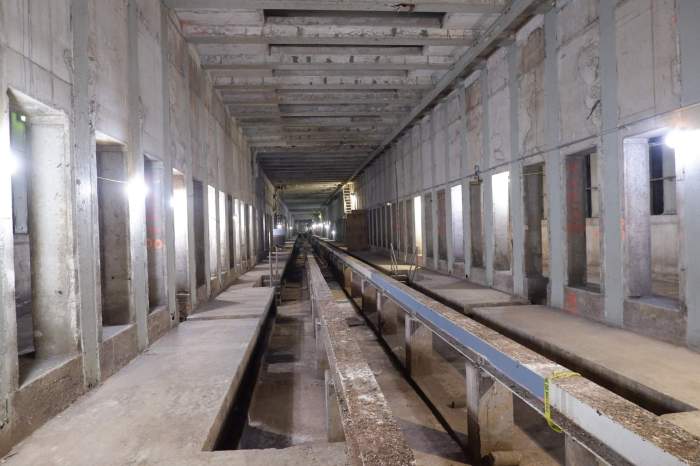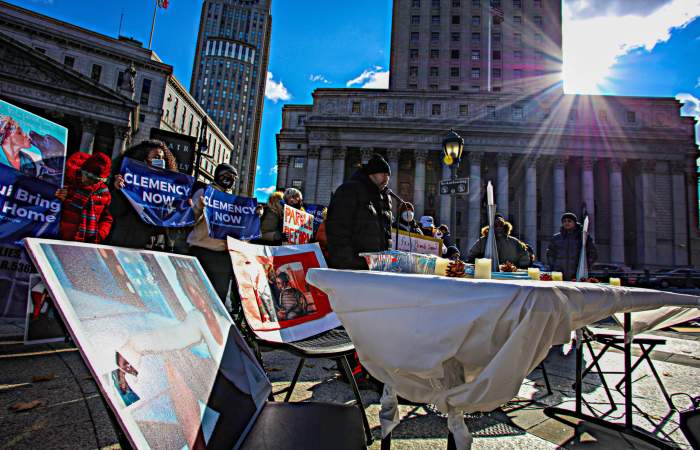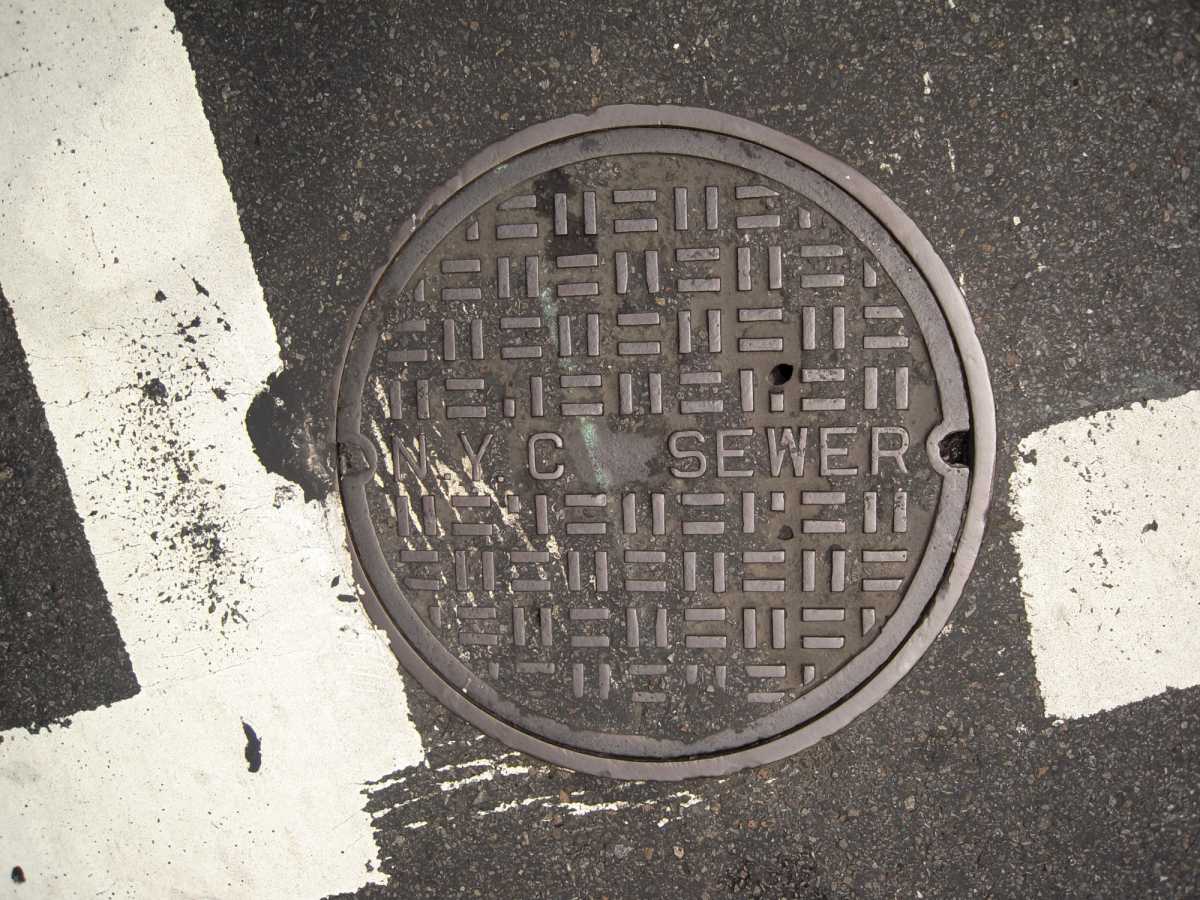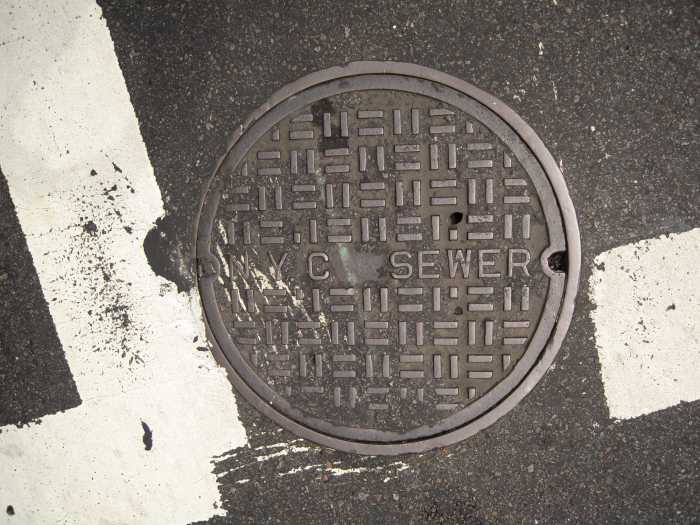Good government groups sounded the alarm about Governor Kathy Hochul’s massive redevelopment project around Penn Station, saying the scheme could cause New York City to lose out on $5 billion of its taxes.
The 10-building, predominantly-office complex planned for the area around the station is supposed to help pay for a facelift of the cramped midtown transit hub.
But transparency advocates urged the governor and the state’s development agency to be more forthcoming about the project’s financing and potential subsidies for developers, so that Big Apple taxpayers don’t end up holding the bag if the skyscrapers don’t rake in enough money.
“Unfortunately, Penn Station Area Development… has become a symbol of secretiveness and the unaccountability of State power,” read the Monday missive to the governor and state legislative leaders. “We ask the Governor and you to halt this project until it is completely and publicly transparent and the people of New York City and their elected representatives are given a fully informed and meaningful voice.”
The Feb. 28 letter— first reported by the New York Post — was sent by Common Cause New York, Reinvent Albany, the League of Women Voters, BetaNYC, New York Public Interest Research Group, and the Tri-State Transportation Campaign.
The groups joined a chorus of critics of the mega-project launched under former Governor Andrew Cuomo in early 2020, which Hochul revived in November while paring back its size by 7% to 18.3 million square feet and adding some 1,800 apartments into the mix.
Hochul and her predecessor argued that the development will pay for a separate $6-7 billion plan to renovate Penn Station, which includes removing one or two floors to open up the claustrophobic concourses and letting in more light, while adding 8 acres of public space.
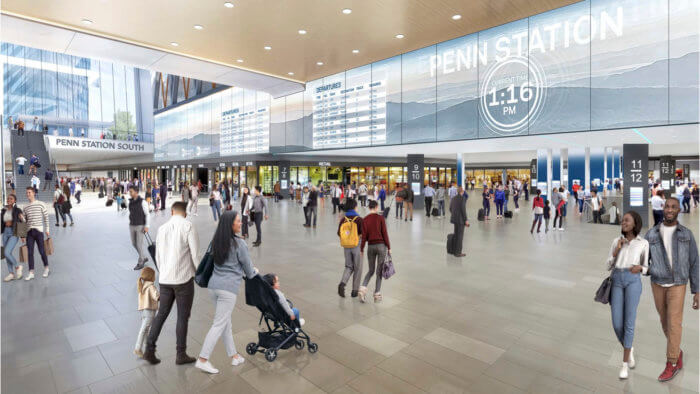
The station revamp does not add any new rails or platforms to Penn, but the governor wanted to fast-track the overhaul first rather than tie it to the larger federally-controlled Gateway project that will include expanded train capacity and tunnels across the Hudson River to New Jersey.
The current state budget allocates $1.3 billion for the station plans, but the state’s Empire State Development, which oversees the project, has yet to say how exactly it will make up the roughly $5 billion difference.
The project has also drawn scrutiny about its financing from the City Planning Commission, state Senate Finance committee chairperson Liz Krueger, and nearby residents during a marathon public hearing in December.
Influential developer Vornado Realty Trust owns or leases the largest share of the development and the state plans to allow the builder to make so-called payments in lieu of taxes, or PILOTs, to pay back bonds that will finance the state’s share of renovating Penn, a method the officials also used for the Moynihan Train Hall.
The city’s similarly-sized Hudson Yards project promised to fund an extension of the subway’s 7 line by also using PILOTs, but the West Side complex ended up included more than $1 billion in tax breaks to commercial office developers, and the city was still on the hook for millions of dollars to pay back its bonds.
“The same exact thing could happen to New York State,” said Rachael Fauss, an analyst with Reinvent Albany. “There’s even more uncertainty in the real estate market now because of COVID and a slow return to the office and, perhaps, completely-long term changes to commuting patterns.”
Even in the state’s own best case scenario, real estate proceeds will only make up “a portion, but not all, of the billions of dollars necessary,” according to a financial presentation of the original project from May.
PILOT financing would also allow Vornado to forego city property taxes on its developments, and the letter called on ESD to clarify how much municipal coffers might lose out on or how many subsidies the developers could reap.
Vornado CEO Steven Roth is a well-connected real estate magnate and donated the maximum allowed $69,700 to Hochul’s election campaign in December, according to state records.
Vornado did not respond to a request for comment.
The transparency advocates also criticized the state for overriding the city by leaning on a 2018 law pushed by Cuomo that labelled Penn Station a “public safety hazard,” allowing the state to bypass the so-called Uniform Land Use Review Procedure, or ULURP, used for rezonings, and seize private properties through eminent domain.
“ULURP is imperfect, but is massively superior to the Empire State Development Corporation making unilateral decisions about the future of a crucial part of New York City and potentially billions in NYC tax revenue,” the letter read.
“We believe this was a wrongheaded and potentially hugely costly usurpation of NYC home rule and a terrible precedent,” the advocates continued.
ESD claimed the city would be “made whole” for its existing taxes, but a spokesperson declined to specify how much revenue from the new development would be diverted from municipal coffers, citing ongoing negotiations.
“Halting the Penn Station Area project only delays the long overdue improvements this plan would deliver for residents and riders alike, and demonstrates an unfamiliarity with ESD’s ongoing public process,” said Matthew Gorton in a statement. “No financial agreements have been entered at this time.”
The rep anticipated the proposal to come before ESD’s board for a vote in early summer.
Hochul’s office did not respond for comment.





